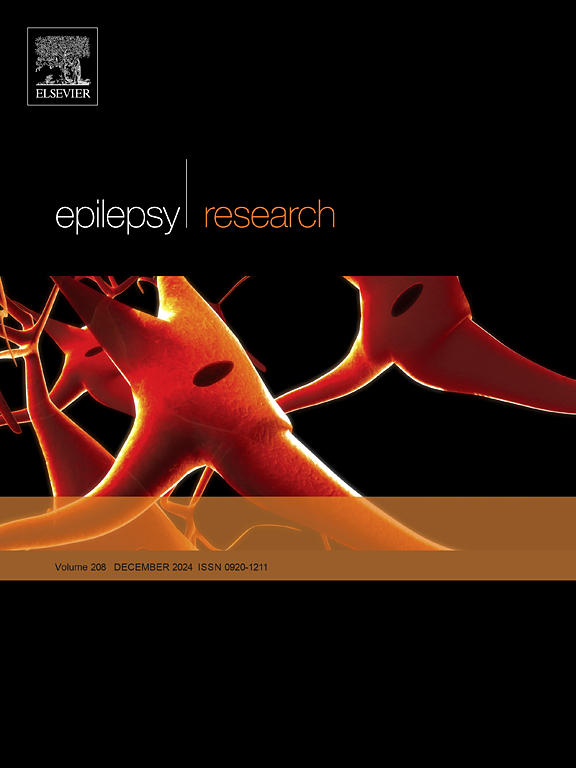Addressing the gap: SUDEP knowledge and communication among patients and neurologists
IF 2
4区 医学
Q3 CLINICAL NEUROLOGY
引用次数: 0
Abstract
Objectives
Sudden unexpected death in epilepsy (SUDEP) is a major cause of mortality in epilepsy. Effective management of SUDEP risk depends on a solid understanding of SUDEP and its associated risk factors. This study evaluates the perspectives of both patients and neurologists on SUDEP discussion.
Methods
A cross-sectional study was conducted at Mansoura University Hospital in Egypt, involving 173 adult epilepsy patients and 26 neurologists. Patients completed structured, in-person surveys assessing their awareness of SUDEP and preferences for receiving related information. Neurologists were surveyed regarding their knowledge of SUDEP risk factors, frequency of SUDEP discussions, and perceived barriers. Data analysis included descriptive statistics, Chi-square tests, and binary logistic regression.
Results
Among patients, 84 % had never heard of SUDEP; however, 92 % expressed a desire to be informed, with 75 % preferring detailed information from a neurologist. Neurologists demonstrated limited knowledge, with only 27 % correctly identifying key SUDEP risk factors. Additionally, 65 % rarely or never discussed SUDEP with patients, citing concerns about inducing anxiety and impacting quality of life. Knowledge level among neurologists was not significantly associated with the frequency of SUDEP discussions.
Conclusion
This study identifies a major gap in SUDEP awareness among patients and neurologists, with patients expressing a strong preference for information despite limited discussions by clinicians. Targeted educational initiatives are needed to bridge this communication gap. As the first study from the MENA region to assess both perspectives, it also contributes a unique sociocultural understanding to global SUDEP research.
解决差距:患者和神经科医生之间的猝死知识和沟通
目的癫痫猝死(SUDEP)是癫痫死亡的主要原因之一。对猝死症风险的有效管理取决于对猝死症及其相关风险因素的深刻理解。本研究评估了患者和神经科医生对猝死症讨论的观点。方法对埃及曼苏拉大学医院173例成人癫痫患者和26名神经科医生进行横断面研究。患者完成了结构化的面对面调查,以评估他们对SUDEP的认识和接受相关信息的偏好。对神经科医生进行调查,了解他们对SUDEP危险因素的了解,讨论SUDEP的频率,以及感知到的障碍。数据分析包括描述性统计、卡方检验和二元逻辑回归。结果84 %患者从未听说过SUDEP;然而,92% %的人表示希望了解情况,75% %的人更愿意从神经科医生那里获得详细的信息。神经科医生表现出有限的知识,只有27% %正确识别关键的SUDEP危险因素。此外,65% %的医生很少或从未与患者讨论过SUDEP,理由是担心会引起焦虑和影响生活质量。神经科医生的知识水平与SUDEP讨论的频率无显著相关。结论:本研究确定了患者和神经科医生在SUDEP认知上的主要差距,尽管临床医生的讨论有限,但患者仍表达了对信息的强烈偏好。需要有针对性的教育举措来弥合这一沟通差距。作为中东和北非地区第一个评估这两种观点的研究,它也为全球SUDEP研究提供了独特的社会文化理解。
本文章由计算机程序翻译,如有差异,请以英文原文为准。
求助全文
约1分钟内获得全文
求助全文
来源期刊

Epilepsy Research
医学-临床神经学
CiteScore
0.10
自引率
4.50%
发文量
143
审稿时长
62 days
期刊介绍:
Epilepsy Research provides for publication of high quality articles in both basic and clinical epilepsy research, with a special emphasis on translational research that ultimately relates to epilepsy as a human condition. The journal is intended to provide a forum for reporting the best and most rigorous epilepsy research from all disciplines ranging from biophysics and molecular biology to epidemiological and psychosocial research. As such the journal will publish original papers relevant to epilepsy from any scientific discipline and also studies of a multidisciplinary nature. Clinical and experimental research papers adopting fresh conceptual approaches to the study of epilepsy and its treatment are encouraged. The overriding criteria for publication are novelty, significant clinical or experimental relevance, and interest to a multidisciplinary audience in the broad arena of epilepsy. Review articles focused on any topic of epilepsy research will also be considered, but only if they present an exceptionally clear synthesis of current knowledge and future directions of a research area, based on a critical assessment of the available data or on hypotheses that are likely to stimulate more critical thinking and further advances in an area of epilepsy research.
 求助内容:
求助内容: 应助结果提醒方式:
应助结果提醒方式:


